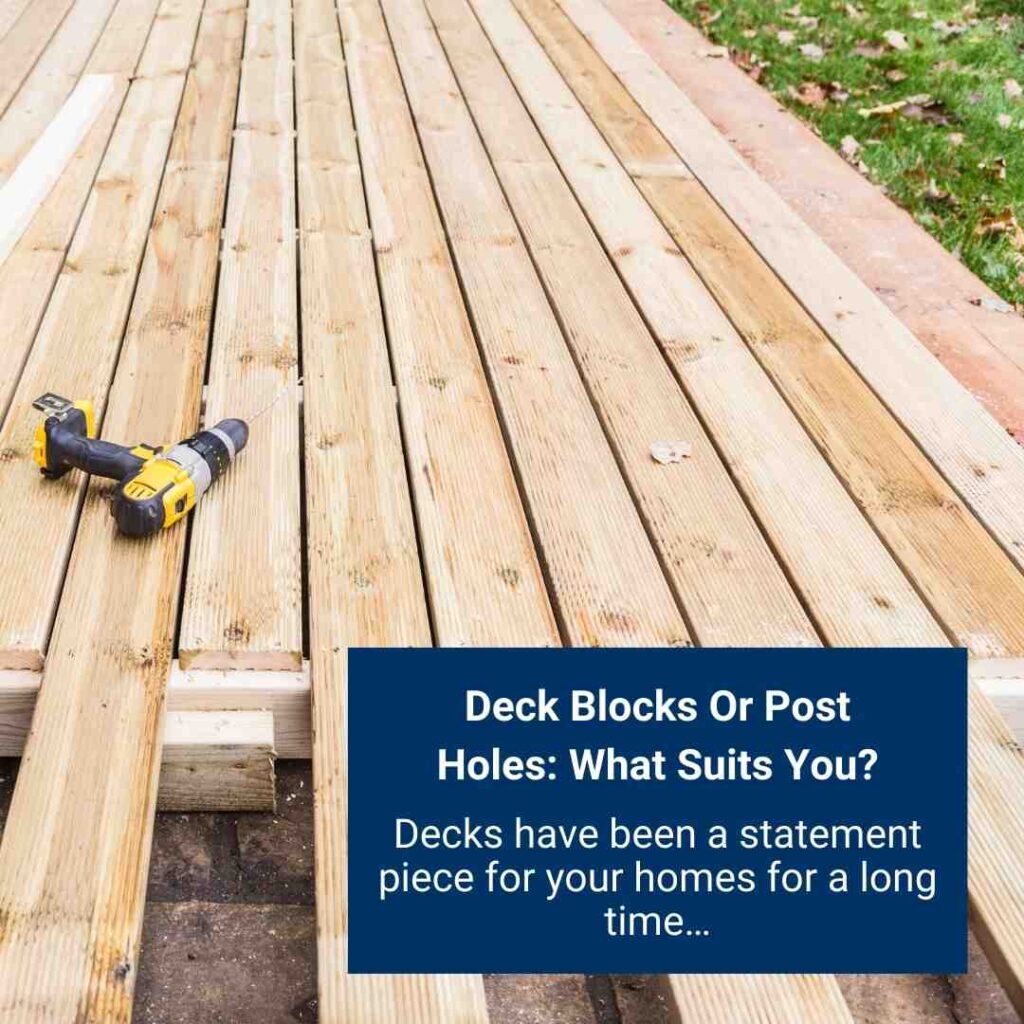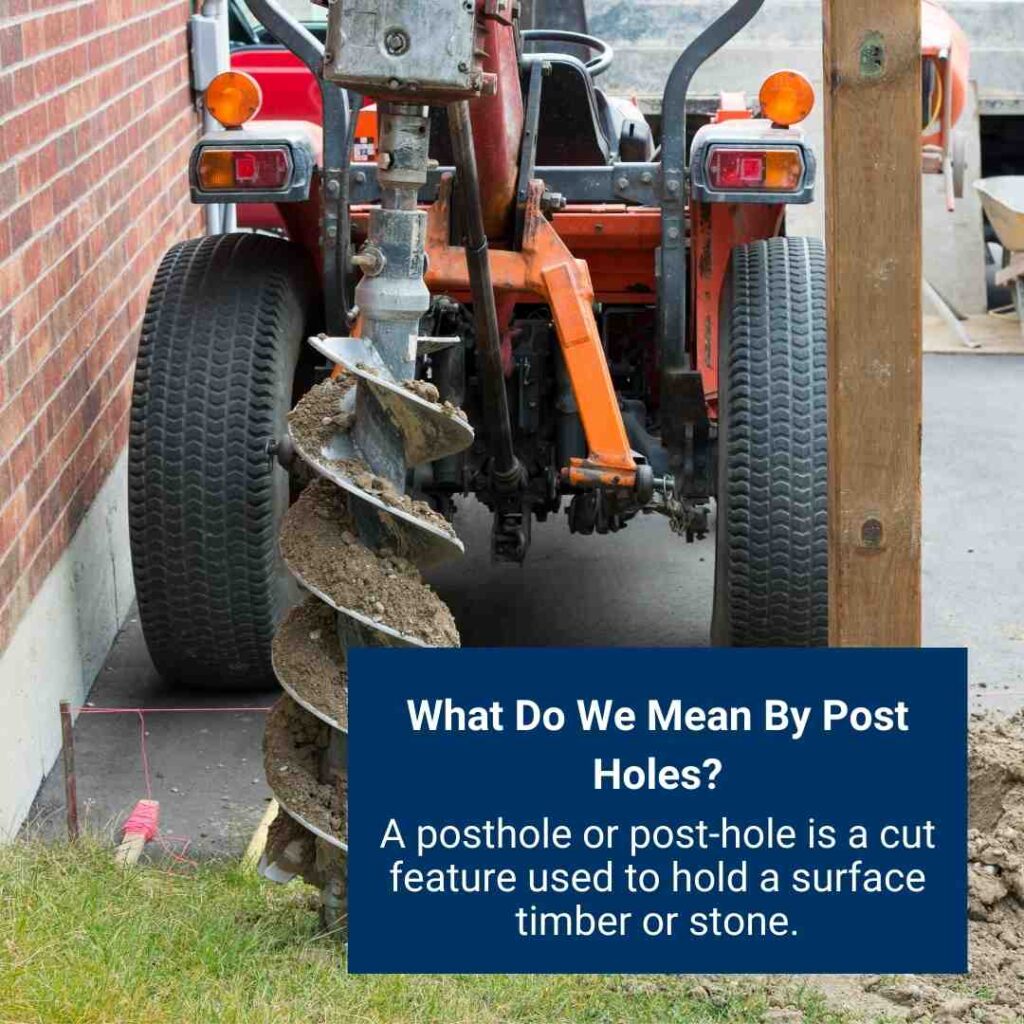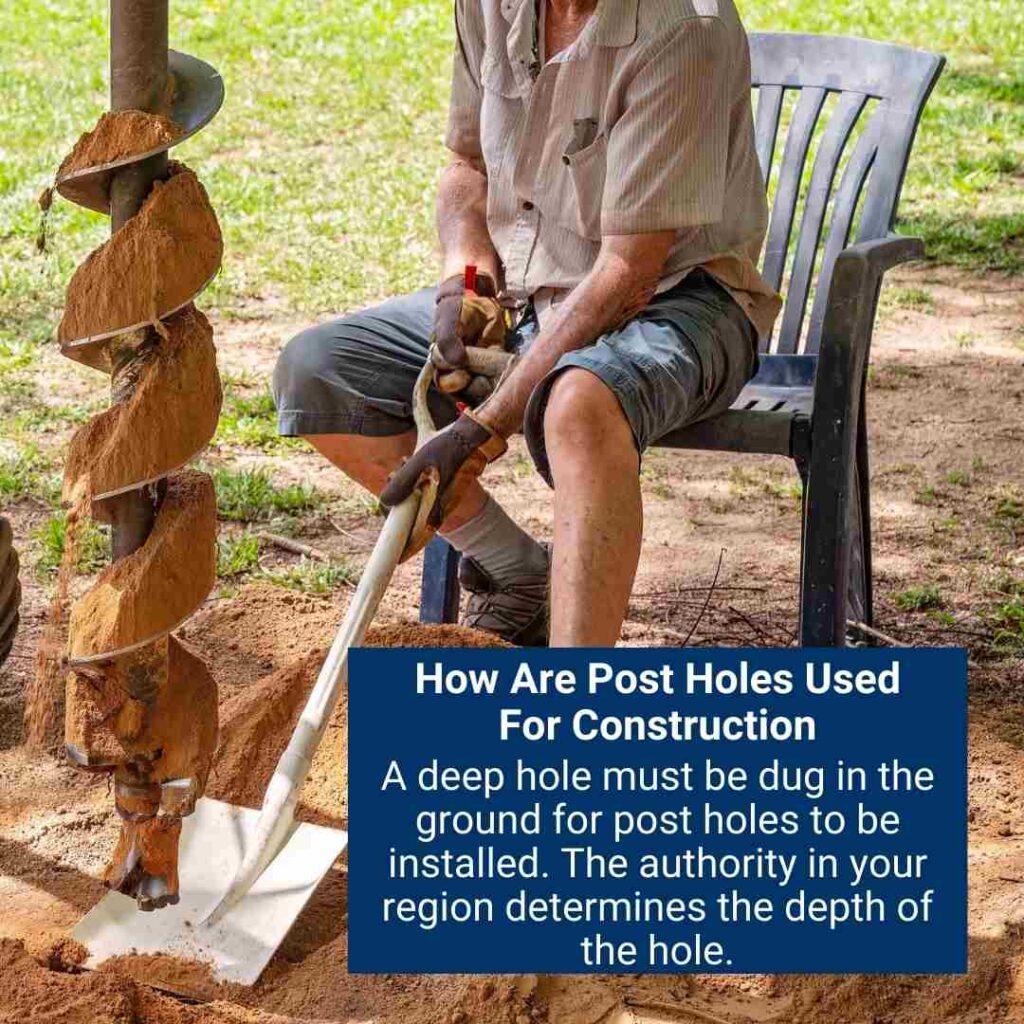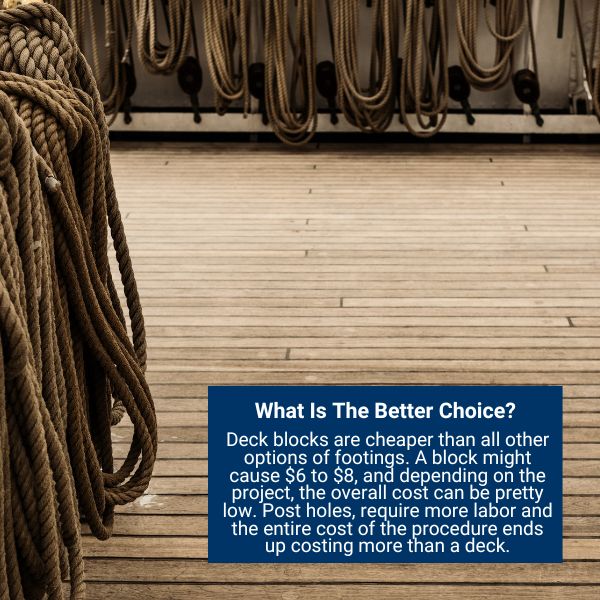When giving in time, effort, and money, it can hold utmost importance for you to select the perfect deck foundation: Deck Blocks or Post Holes?
Every other constructor you call has a different opinion on what you should pick. They are also thinking of their benefits and might guide you wrong.
How often do we get blind-sighted and pay more for the wrong things? You will soon be free from this worry once you read this article, as I comprehensively covered every aspect of Deck Blocks Vs. Post Holes.
Deck blocks are easier to install, perfect for small, ground-level decks, and require no digging. Post holes, filled with concrete, provide stability for higher decks and can handle larger loads. They demand more effort and time. Each has its unique benefits for different deck types.
Now, let’s focus more on the topics at hand so that you can make a more informed decision.
The next time a carpenter tries to play you, ignore their chatter and stick with the option you know best suits your needs.
Deck Blocks Or Post Holes: What Suits You?
Before going on a spree and getting meaningless things for your front lawn or RV front, make a clear plan about what to buy and skip.
Decks have been a statement piece for your homes for a long time.

Need to revamp the look of your boring old home? Add a deck!
Mostly, it turns into an expensive process, and if you are short on luck, it might not even look that good after installation.
So, do you need a deck that is both functional and strong? You surely won’t like the idea of a gust of wind blowing your deck away or causing damage to it.
For a strong foundation, it is fundamental that the base of your structure is solid and sturdy.
There are countless ways to get that strong foundation for any structure you want to build. The common ones include:
- Deck Blocks
- Post Holes
- Concrete Footings
First, you need to determine what the deck blocks and post holes are.
What Are Deck Blocks?
Deck Blocks are precast concrete blocks.
They consist of different shapes and have formations at their top to hold beams and logs, which can support whatever structure you want to build.
They are comparatively heavy, and since they vary in shape and size, the approximate weight of a deck block would be 48 lbs or 21.77 kgs (or taken as 22 kgs).
For a rough idea, you can picture them to be up to 8 inches high and are typically 10 to 11-inch squares.
Also Read: Should You Install Deck Posts in Concrete or On Top?
What Are Post Holes?
Setting up Post holes is a slightly more technical and complex process.
The setup of the post holes will vary according to your constructors because there is not just one way to get it right.

To give you a better idea of what a post hole is, it’s basically what the name
suggests! ‘Digging a hole in the ground. However, you need to fill it with some material- which you will get to in the latter part of this article.
You also need to embed an anchor bolt into the material- which is often concrete, such that almost an inch of it is showing.
Secure the post brackets with washers and nuts while setting the pressure plate on top. Next, you should place the posts on the brackets and attach them with 10 penny nails or structural screws.
And here you have your post holes!
Also Read: Should A Deck Be Level Or Sloped?
How Are Deck Blocks Used For Construction
To construct any structure like a deck, first set up the ground where you intend to build.
Even though deck blocks do not require holes to be dug or mixed concrete, they still need uniform leveled ground. If there is grass on the soil, that needs removal too.
After the ground seems leveled, it’s time to place the deck blocks with equal spacing.
The number of blocks required depends on what kind of deck you want and how big you would like it to be.
You can start building your structure by attaching logs and beams to its top. Some math and measurements are required to set a good base.
How Are Post Holes Used For Construction
A deep hole is dug in the ground as a starting point to install post holes. The authority in your region determines the depth of the hole.

The height depends on the frost line, which varies from place to place. Also, you can use a power auger for making the holes which should generally be six inches deeper than the frost line.
Concrete footer tubes are placed inside the holes and filled with concrete. Another material, Sika post fix- expandable foam, can also be used.
The posts should be attached above the ground because they can break inside the concrete.
What Is The Better Choice?
Deck blocks are cheaper than all other options of footings. One block might cost $6 to $8, and the overall expenses can turn pretty low, depending on the project.
Also Read: Cheapest Ways To Build A Deck In 2022
There is no need to dig holes for them and use expensive tools and machines. Even a single person can handle them, which makes the job easier.
Post holes, on the other hand, require more labor and the entire cost of the procedure ends up costing more than a deck.

They are corrosion-resistant and won’t decay.
Post Holes provide better support to the structure. Due to the concrete and the deep holes, it gains its robustness from the ground and results in a firm, stable base.
Unlike deck blocks that do not prevent frost heave, post holes stay unaffected by it as they are dug way below the frost line.
Since you can set the height of the posts according to your needs, it gives you the liberty to make many types of structures. On the other hand, deck blocks can only give you slightly raised decks.
You can use post holes in any area; however, you cannot use deck blocks in areas with sinking soil, high winds, and frosty environments.
Conclusion
All in all, even though it is easier to build a deck using deck blocks and cheaper, you only have a few options of structures and only a few places where you can use them.
Post holes provide a more substantial base, can be used anywhere, and are adaptive to the designs you have in mind.
Even though post holes are more expensive, I suggest going with them if you want a durable build that stays for a long time.
But if you are looking for a playful DIY project that can temporarily change your boring front yards, deck blocks are the ideal choice.
Also Read: Best Wood For Decking:

